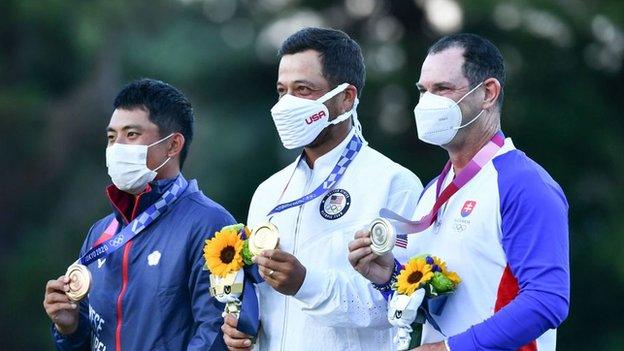Tokyo Olympics: 'Go-for-it golf' settles format debate at Games
- Published
- comments

Xander Schauffele (middle) won a captivating men's strokeplay event over 72 holes
It is time to put to rest the notion that the format for Olympic golf tournaments is all wrong.
There is no better way than 72-hole strokeplay to determine medal destiny in individual tournaments. This was emphatically proved during Xander Schauffele's triumph in the men's event at the Tokyo Games.
But it does not mean Olympic golf is fully realising its potential with the current set-up. Despite the success of the sport's return at Rio in 2016 and a thrilling men's tournament in Japan, significant changes could - and should - be made.
Mechanisms to incorporate team and mixed elements, if not essential, are certainly desirable. But the standard, legitimising principle of every stroke counting should always remain.
How many times have we heard that the Olympic tournaments should move away from "boring 72-hole strokeplay"? This, though, was thoroughly exposed as a lazy and erroneous evaluation by events at the Kasumigaseki Country Club last week.
When there are only three prizes and a complete absence of place money, as is the case in Olympic golf, competitors are left with no choice but to play 'go-for-it golf'.
Every shot counts meaning all four days, including rounds where players traditionally jockey for position, were captivating. For the second Games running, the men's tournament boiled to a thrilling climax.
Tokyo Olympics: Schauffele clinches men's golf gold medal
When Schauffele held his nerve to make a composed par from the trees on the 72nd hole to succeed Justin Rose as men's champion, he was one of nine players occupying medal positions. There were three more within a stroke.
Eventually, seven players entered a shootout for bronze. In the UK, fans rooted for Paul Casey while countries with less established golf audiences, such as Chile, Colombia and Taiwan, followed fortunes of their representatives.
CT Pan, the lowly world number 208 playing for Chinese Taipei, ultimately made the podium by beating the American giant Collin Morikawa, a recently crowned Open champion.
It was an outcome that encapsulated true sporting glory; hard earned over four sweltering days. Rory Sabbatini, a 48-year-old South African playing for his wife's native Slovakia, had already surged to silver with a record-breaking 61.
And Schauffele, a top-five player from the United States with cosmopolitan European and Asian sporting heritage, was a fitting gold medallist. He undoubtedly played the best golf as the unarguable metrics of 72-hole strokeplay proved.
However, the success of mixed male and female events incorporated by other sports such as triathlon, swimming and track and field could also work very well in golf. It is a dynamic that would showcase tactics and technique while filling a huge gap in the golf market.
For it to happen, the men's and women's events would need to be held simultaneously, which should be possible when both fields are limited to 60 players. This would enable a 36-hole mixed tournament to be added on.
An alternate-shot medal format, lowest score wins, should suit perfectly and the golf programme could be completed in six competitive days. That would help lessen the impact on already crowded global playing schedules.
And, as was proved magnificently in Northern Ireland last weekend, running simultaneous men's and women's tournaments at the same course is perfectly feasible.
At the ISPS Handa World Invitational, jointly sanctioned by the European Tour, Ladies European Tour and LPGA, Thailand's Pajaree Anannarukarn claimed the women's title and Daniel Gavins won the men's tournament.
CT Pan wins bronze after dramatic seven-way play-off
While embracing new ideas such as this event, promoted by musician Niall Horan's management company, the main tours should continue to bend to accommodate Olympic golf.
Every four years it draws the sport out of its usual echo chamber of playing to established golf audiences and allows fresh eyes to witness and enjoy the game's delights.
Another improvement to the Olympic format would be to aggregate the totals of the leading pair from each country to create a team competition out of the individual events.
As Casey and Rory McIlroy battled for medals, their compatriots Tommy Fleetwood (16th) and Shane Lowry (22nd) had little to play for after falling out of contention for individual glory.
We regarded them as team-mates for Great Britain and Ireland, respectively, but they were, in truth, medal rivals to each other despite wearing the same kit.
Last week, Americans Schauffele and Morikawa would have won gold at -33, Chile silver at -29 and GB bronze at -26 with Ireland at -25. The likes of Fleetwood and Lowry would have been in the thick of a medal hunt until the very end of their rounds.
But there was no mechanism for them to help each other and finding a way to enable that aspect would further enhance interest in the golf tournaments.
Nevertheless, this week's women's tournament still promises another fascinating event with Mel Reid and Jodi Ewart Shadoff representing the British challenge.
"I can't tell you how excited I am to represent Team GB in the Olympics," said the 33-year-old Ewart Shadoff.
"It's been a goal of mine for the last five or six years to go to the Olympics and represent the Union Jack there, try and win some medals for Great Britain. Yeah, it's quite the honour."
Reid is equally pumped, having missed a major - the Evian Championship - last month to avoid Covid complications and ensure her place in Japan.
Both Britons have profited from decisions by compatriots Charley Hull and Georgia Hall to give Tokyo a miss. Their priorities lie elsewhere which, in an individual sport, is their prerogative.
But given the ongoing success of golf's Olympic project and potential for more improvements, fewer and fewer players - surely - will be so ambivalent in future.

The man who introduced Joe Wicks to meditation: Exploring spirituality and mindfulness with Russell Brand
The Ancient Olympics: You're Dead To Me explores how even death couldn't stop you winning

